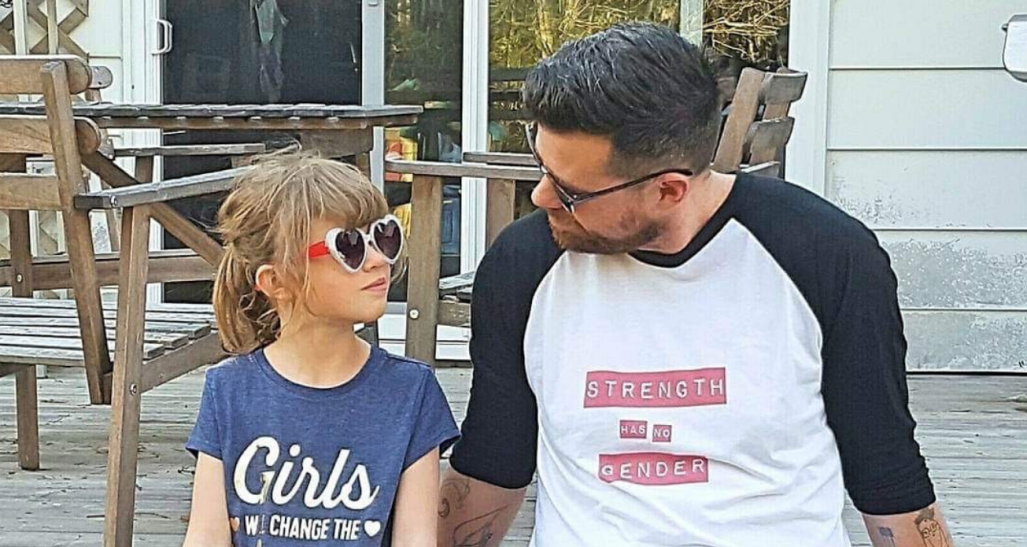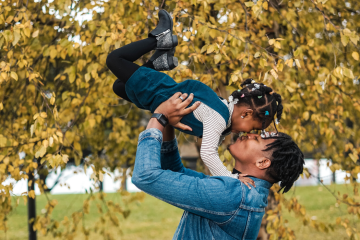
Traditional parental roles, responsibilities and engagement have slowly been shifting — but recent months of unexpected togetherness might have put that process in overdrive.
Is it possible that being a dad means something different than it once did? With Father’s Day near, NRF asked a few “dad influencers” to share their thoughts.
Mike Reynolds, @everydaygirldad
Mike Reynolds runs an online feminist shirt and cross-stitch shop, produces the Sew Manly Podcast and blogs. They’ve spent the pandemic isolated in Ottawa with their partner Andrea, two cats and two young daughters in a house that feels “thirteen sizes too small.” (Can anyone relate?)
“Emotional labor in the household is very real and having constant discussions with partners is very important.”
Mike Reynolds
You’ve mentioned that being a parent is the most important thing in your life right now. What makes you say that?
I think it’s the enormity of the role. Everything you do is tied in a way to your role as a parent. I mean, not everything you do is about parenting, but everything I do is as a parent. And everything I do around my kid impacts the way they grow up.
It’s not just the two-hour lectures we give them while sitting on the edge of their beds. It’s the small three-second interactions we have with strangers. They pick up on these things and see how we treat people.
Those who follow you on social media might learn about mental health, menstruation, masculinity and other subjects that aren’t always common in conversation. What overall message do you most desire to convey?
There has to be constant learning as a parent, and what you learned as a child isn’t necessarily what’s right as a parent. We need to make sure we’re learning ourselves and pushing the things we are uncomfortable with and examining why. And then teaching those things to our kids.
Learning about these things, I have discovered so many great things about myself, too. A comprehensive sexual and reproductive health education has helped me better understand gender and sexual orientation better for myself, as well as giving my kids a better understanding for themselves.
Opening up these conversations between men and for men and about men can help shift the way men understand how they can live and act, and that they need to be more active participants in shifting culture.
How do you believe being a “dad” has changed over time? In what ways might the pandemic and stay-at-home season have influenced that further?
I would like to think there’s going to be a continued push for more involvement and a continued push for dads to not accept that simply being involved means equal parenting. Emotional labor in the household is very real and having constant discussions with partners is very important.
I think we need to continue to push back on what traditional families look like and look at gendered language within families, too. Men need to continue to push for inclusive parental- leave policies and continue to push back when they are praised for work women have long been doing.
Damarqio (DK) Williams, @detroitfather

Damarqio (DK) Williams admits he’s “still getting used” to the role of influencer, primarily on Instagram. But so far, so good. He not only received a call from Pampers to become a local “dadvocate” — as a champion of fatherhood and positive change, he also founded Detroit Social Circle, a platform for Detroit men of color to “build the future and restore the past.” DSC worked with local businesses, for example, to install baby-changing tables in public men’s restrooms. Williams is project manager at Bedrock Detroit, the largest full-service real estate firm in Detroit, and is an alumnus of the national New Leaders Council.
You’ve mentioned that you grew up without your biological father in your life, and that you hope to share your experiences with others — especially from the unique perspective of being an urban father in Detroit. What do you most desire to convey?
Growing up without my biological father’s presence left so much anger and fear of his abandonment. Most times I felt as if I did something wrong — and that I would never become a “good father.” But the bottom line of my mission is to inspire fathers and fatherless children that you can give something you never received.
How do you believe being a “dad” has changed over time? In what ways might the pandemic and stay-at-home season have influenced that further?
Being a dad for me changes every day — from my daughter’s development to the impact of society’s view of fatherhood. I constantly define what kind of dad I want to evolve as. Before the pandemic, I was not as intentional — now creating learning activities, meal plans and even growing a garden are part of my daily routine. I have also started a YouTube channel with my daughter to grow our reach as an influencer family.
Home for us has never been more essential — a haven for comfort, safety and fun. We have some friends with closely aged kids, and we have weekly Zoom calls so our children can interact with each other.
Ryan Maltbie, @themaltbiebunch
Ryan Maltbie and his wife, Samantha, head up The Maltbie Bunch, a powerhouse influencer family based in California. Since the fall of 2016, they’ve recorded more than 1,000 vlogs and worked with some of the world’s largest companies, capturing various moments of daily life. The aim is to be open and honest and authentic — all while remaining positive. Maltbie is also CEO of BBQGrills.com.

How do you and Samantha divvy up duties, from work to kids to house chores? As a couple, what overall message do you most desire to convey?
It's not easy! Running a multimillion-dollar business out of the home, managing a social media following of over 250,000 fans collectively, being parents to four children, chores, school and trying to squeeze that thin margin of time into “us time” isn't easy.
However, we love it. Our fans who watch and engage with our content know one thing for sure: We're very open about our struggles, we don't sugarcoat anything and we want other families going through these same types of hurdles to know they're not alone.
How do you believe being a “dad” has changed over time? In what ways might the pandemic and stay-at-home season have influenced that further?
My definition of being a father has changed dramatically over the course of time. Being a teenage father to now being a father under 30 with four kids has allowed me to put a lot of things into perspective.
I can honestly say that it's one of the few reasons that I'm able to strive for so much, because my children give me a burning passion to want to show them how to always strive for the best, capture every moment and never leave anything “as is.”